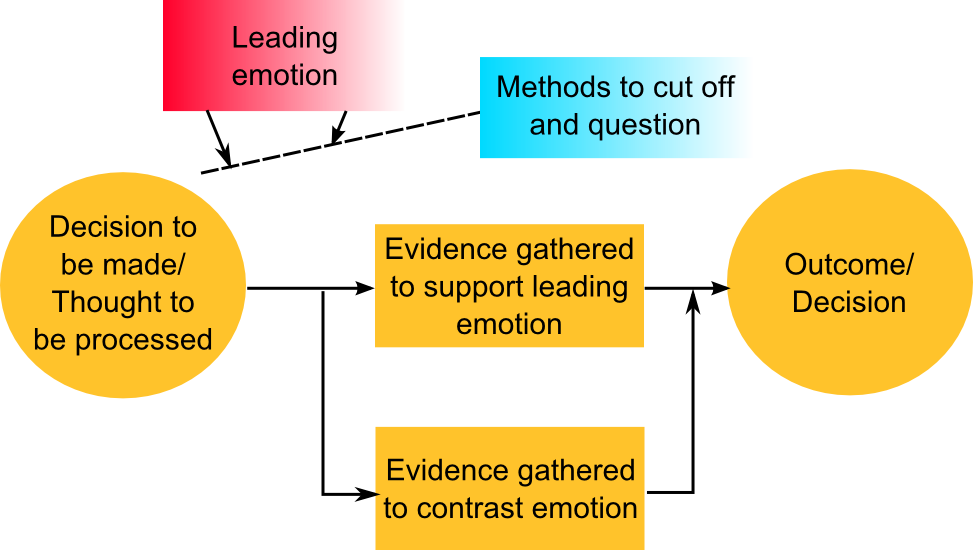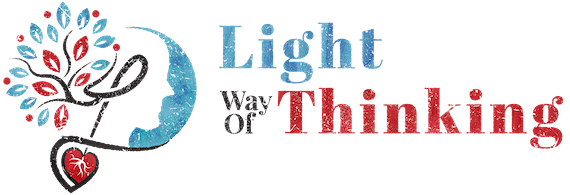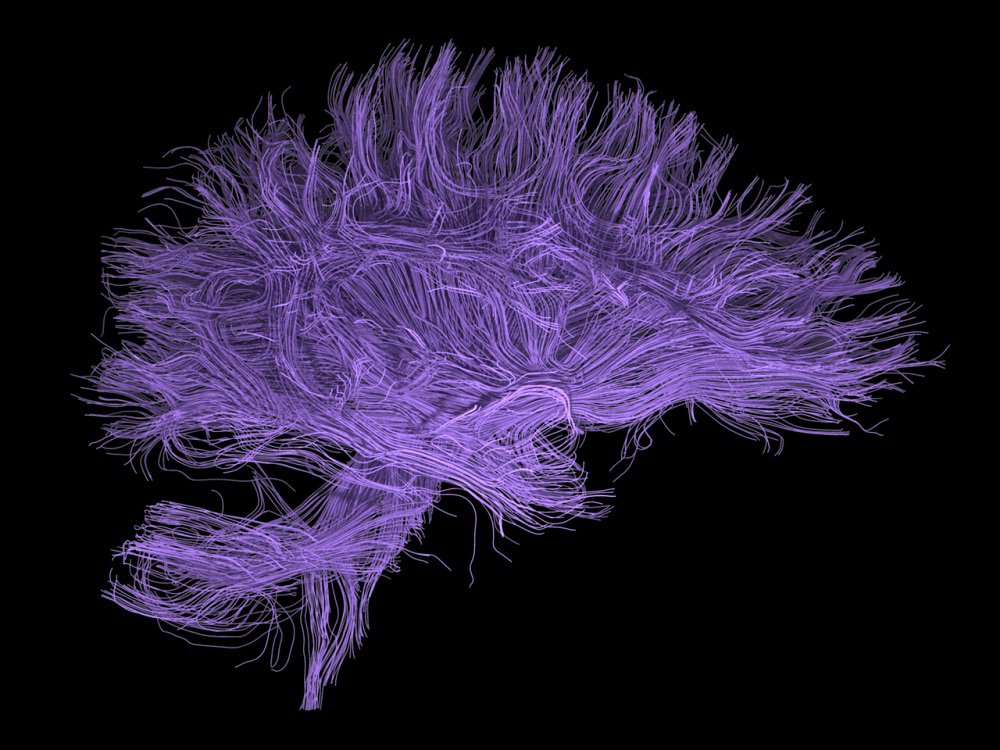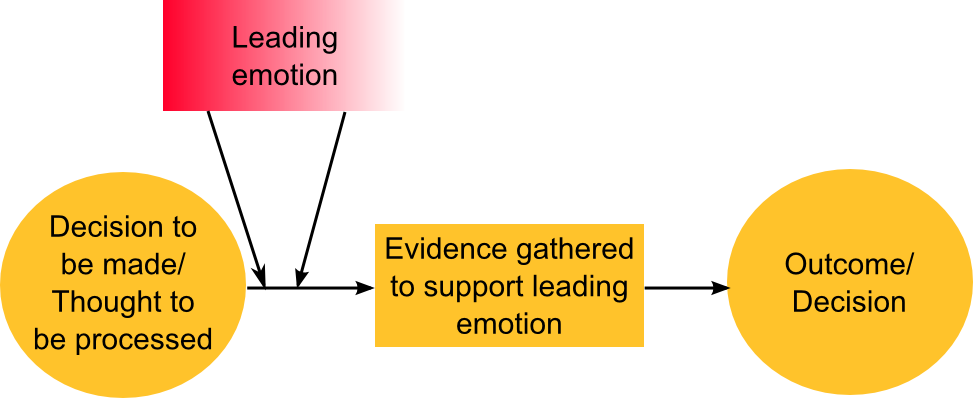I’ve already decided on what I want. I know I’m right so fuck what other people are telling me and anything to the contrary” is a straight forward way to describe the psychological term confirmation bias. The problem is when this is applied to depressive thinking, such as “I’m a loser”, it can be quite harmful.
How do you stop negative thinking, and how do you begin positive thinking?
Why do you get in to shame spirals and why do negative thoughts never stop?
There must be something driving them. Let’s look at this from a decision making perspective.
What Is Confirmation Bias?
This is how you think you come to conclusions or make decisions:
Confirmation bias (CB) is when you search for information that validates the emotions driving you behind the scene. It is an error in logical reasoning where in reality, your emotions are dictating your logic and not the other way around.
In can be a horrible player in decision making, and it’s one of the reasons why Chip and Dan Heath discuss it in their book Decisive.
The Heath brothers provide an example of the CB in action with smokers: In the 1960s when the harmful effects of smoking had not been proven yet, smokers were more likely to express interest in reading an article headlined “Smoking Does Not Lead to Lung Cancer,” than one with the headline “Smoking Leads to Lung Cancer.” Hear no evil, see no evil sort of thing. Of course, a smoker would rather feel that they aren’t killing themselves than be worried about getting cancer, so they self-select the article title that works best for them and lowers their anxiety.
So we aren’t that smart, and we trick ourselves into THINKING that we’re doing good research. But actually we’re trying to gather information to support an idea we already want.
We may be deciding between staying together or breaking up with our significant other, but if our emotions (or a major emotion driving us, a leading emotion) are saying we love their company (even though they are using us), guess what’s going to happen?
The problems is that emotions are usually TERRIBLE harbingers of decisions and a poor way to make, what can be, life altering decisions – either about events, or about ourselves. How can you trust something that can disappear in a matter of seconds or minutes, such as extreme anger or fear?
A step is missing here: what if your emotions are playing tricks on you? Just because you FEEL something doesn’t mean it’s necessarily right.
You might FEEL like cheating on your test because you’re too lazy to study, but that doesn’t mean you should (you lazy bum, you).
You might FEEL like you’re a screw up but that doesn’t mean you are (you’re probably a lot better off than you think).
I’m trying to be careful with the CB in planning which city to go to in Asia. My friend is in one city, but there’s a better community in another. I need methods to make sure the CB isn’t sneaking up on me so I don’t make a biased decision.
Confirmation Bias Can Make Anxiety And Depression Worse
OK so now you know that you need to be on the look out for gathering information that pre-supports a decision based on a leading emotion. How does this come into play with anxiety and depression?
Well take a typical person who has low self-esteem due to depression. They may have thoughts such as:
“Nobody loves me.”
“I suck.”
“I can’t do anything right.”
A discussion of the MYRIAD of ways to work through this with positive self-talk and letting negative thoughts pass along with other tools is beyond the scope of this article. But you can sign up for the newsletter for tips and my free e-book that’s coming out for help!
What is really bad though is that if the person who is depressed believes these thoughts, they get turned in to emotions of shame and sadness. Then, they will find reasons in the outside world to justify these thoughts, to make them true… in ANY ordinary situation that might mean NOTHING:
“That woman didn’t smile at me, so I must not be good.”
“My friend couldn’t hang out with me today, so I must suck.”
“I couldn’t do as much work as I wanted to today, so I guess I’ll never get it right. I waste so much time.”
The CB is extremely dangerous when combined with limiting beliefs. I mean, if you didn’t believe that you sucked so much and wanted to change, then it wouldn’t be so hard too, right?
It’s a self-established pattern of eternal shame, and it can come from deep seated micro-traumas and repressed emotions that have not been handled.
The problem is that someone stuck in anxious or depressive thinking cannot see out of the black void to healthier or positive thoughts.
If someone is afraid of going outside, they will gather intelligence NOT to go outside even if they have to guesstimate the truth (“People are scary”) when they haven’t even considered the possibility that something else might happen that would be WAY better.
If you feel scared to go on dates, you may make excuses that sound logical:
“I’m too busy and need to go to the gym after work.”
“I’ll have time to date later on in life.”
“That person just seems OK to me, they aren’t worth my time”
when really the excuses just support your underlying emotion: fear, or avoiding intimacy.
What if your thinking makes you pre-disposed to ALWAYS gathering information about how you are bad, missing all the amazing things that you have done and do, and how you are a great person.
Stopping The Confirmation Bias From Hurting You
There needs to be a way to become less emotional in our decision making and in developing conclusions based on our thinking.
I have developed a number of ways to try and see if I’m succumbing to CB with my thoughts or decisions. We make thousands of micro-decisions every day so it is impossible to check every one, but the important thing is to check the MAIN/LARGE ones or a thought that keeps recurrring. For example: a large decision is moving to a different city, a recurring decision is whether to go the gym or not, a recurring thought might be “I suck”.
Here are some things you can do:
1. Work through your limiting beliefs. Try assuming the opposite belief, testing it, and seeing how you feel after
If deep down you believe you are bad or people are mean, you will always search for information to supports these facts. By identifying and working through limiting beliefs, you can fight the CB as its roots.
2. Ask trusted friends about their opinions/how they would react. Go be with them
Sometimes it’s not enough for you to change your own thinking. You are in your own headspace, thoughts, and reality. Having a fresh opinion not bound by your beliefs is one of the ultimate ways to correct you. When you are making an assumption about yourself (“I didn’t do enough work today”), ask someone else how they would feel in this situation. Is there a difference? This can be a huge booster for self-esteem.
Also, there is a lot that can be earned by just having fun with friends. That might completely change your perspective entirely.
3. Learn about how to make better decisions
In general by reading books such as Decisive, you can learn about techniques that help you fight CB not only in your thoughts about yourself, but in other decisions as well.
4. Learn that though you feel something, that doesn’t mean it’s necessarily right
If you feel scared about going in for a kiss with someone that you find attractive, you may rationalize that “It’s not the right time”, “They aren’t that in to me”, or “We haven’t talked long enough yet” where again, the root causing you to make these decisions is that you feel scared of rejection, being embarrassed, or feeling uncomfortable.
Try asking the question, “How will I feel about this in 2 minutes, 2 weeks, 2 years?”
For the going in for the kiss situation you might answer:
2 minutes: “If I got rejected I guess I would feel embarrassed and maybe a bit of shame, but I know it’s not really that big of a deal. I mean, I’m sure I’ll go on another date eventually. I could even try to go for it again. In fact, I’m pretty proud of myself for pushing to go for it.”
2 weeks: “Oh yeah, I guess that was kind of awkward. But meh, not that big of a deal. I haven’t really thought of it much.”
2 years: “Haha I haven’t thought about them in so long, I mean I’m with someone right now so it’s not even on my radar.”
The short term emotion might not be wrong, but this way, you can at least expand your scope. Remember – all emotions fade away, and just because you feel something (e.g. fear, anxiety, regret, anger) doesn’t mean you can’t proceed forward or let it control you. This is the essence of living an adventurous life.
5. Mindfulness
Again, you are not your mind. If you give energy to a thought it will grow. If you don’t give it any attention, it will die. Even if you hear that you are bad, don’t believe it. Focus on all the friends that love you, the amazing things you have accomplished, and what you can be grateful for instead.
By using these methods, we change the decision making process on thoughts and events:

An improved method of making decisions – The leading emotion that used to be driving the decision or thinking pattern is cut off, and you can gather evidence to support or disprove it and compare things on a more even playing ground.
Note the extra leg that has been added so that you have other evidence to contrast the leading emotion, and can more effectively make conclusions in a given circumstances, especially in self-critical thinking.
Maybe you aren’t so bad after all.
Spoiler: you aren’t.
The next time you are about to make a decision or are stuck in a negative thought pattern, try gathering some external evidence or try something different. Speak to a friend, and think how you might feel about this in 2 days, 2 months, or 2 years about the different options.
But the main thing is to work on yourself to become happier. Cut the leading emotion off, whether it be guilt, shame, regret, or sadness. Realize that you are not bad, no matter what happens. Negative thoughts are just that, yet you give them lots of weight. Stop.
You aren’t bad at all, no matter what your mind says.



